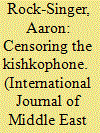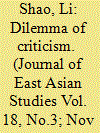| Srl | Item |
| 1 |
ID:
154658


|
|
|
|
|
| Summary/Abstract |
How do states produce religion and how can the study of state censorship cast light on this phenomenon? This article examines the logic by which two Egyptian government bodies, the Ministry of Culture and the Islamic Research Academy, censored the sermons of a premier Islamist preacher, Shaykh ʿAbd al-Hamid Kishk (d. 1999), between 1987 and 1993. To do so, it draws on two distinct sets of sources: a sixteen-volume printed edition of Kishk's sermons published in Egypt and MP3s of original performances recorded initially by audiocassette. While previous studies on religion and state power in the Middle East emphasize the strategies by which states use religion to assert their interests, this article uses the censorship of a leading antiregime preacher to probe the undertheorized distinction between claiming and producing religion. A focus on the strategies, in turn, casts light on both the internal diversity of religious visions within the Egyptian state and on the subtle, yet significant, ways in which state actors not only censor but also are shaped by their Islamist challengers.
|
|
|
|
|
|
|
|
|
|
|
|
|
|
|
|
| 2 |
ID:
166146


|
|
|
|
|
| Summary/Abstract |
Recent literature claims that China censors information that has the potential to ignite collective action. This article extends this finding by arguing that Chinese censors respond differently to political challenges than they do to performance challenges. Political challenges call into questioning the Party's leading role, whereas performance challenges are directed at the failures of public goods provisions. A survey experiment of about 60 media professionals finds that censors are inclined to block political challenges and to tolerate criticism of the government's performance. However, when criticism contains both performance and political challenges, censorship is far more likely. By exploring the range of censorship activities, the results suggest that the Chinese regime's reliance on popular support constrains its censorship decisions.
|
|
|
|
|
|
|
|
|
|
|
|
|
|
|
|